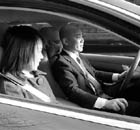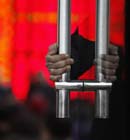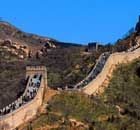-
-
China Daily E-paper
Liu Shinan
The hollow sirens of law enforcement
By Liu Shinan (China Daily)
Updated: 2010-03-24 07:06
 |
Large Medium Small |
I am so notorious at work for enjoying long-distance drives - usually speeding - to my home province in the south for a vacation that colleagues will often ask me if I "have driven somewhere lately?" In the past - I mean five or six years ago - I would reply with a cheerful "yes" followed by an enthusiastic description of how great it felt to drive on the newly built expressways. Nowadays my answer is usually a negative "seldom" followed by an explanation of how horrible it felt to drive in the stream of overloaded trucks.
China has built many expressways in recent years. The quality of the roads and infrastructure is so good that they can beat any of their counterparts in the United States, Germany and Australia, where I've had the experience of driving a car. But the road management in this country is a far cry from the oversight in Western developed countries. Though road authorities have made efforts to regulate traffic on highways and expressways, fatal accidents occur frequently, usually involving heavy-duty trucks in most cases.
With the national economy growing at a fast clip, China's roads are increasingly crowded with trucks carrying all kinds of goods. Though this is certainly a welcome scene, the juggernauts have become more and more a threat to other motorists as well as to themselves. Heavy loads, long durations of driving with fatigue, reckless driving and poor maintenance of safety equipment are the most frequently found problems with truck drivers. Their regulation certainly depends more on the road authorities' supervision than on their own conscience.
The supervision, however, is not always there.
It would be unfair to allege that highway authorities are sluggish in their jobs, but they are definitely not strict enough in their supervision. They seem to be more earnest in tasks that consume less effort but provide more joy, such as ticketing drivers who speed and fining drivers of overloaded trucks. For tasks that call for more meticulous efforts, such as checking the buffer bar at the rear of a truck, they would happily be ready to overlook them.
A buffer bar is a critical equipment installed at the rear end of a truck that can block a car from crashing into the bottom of a truck when a collision occurs. It is a requirement for trucks to install the bar. But it seems neither drivers nor highway patrol take it seriously. It is the police's responsibility to make sure that all trucks are equipped with the bar, but one can find a lot of trucks without the lifesaving measure.
Even in those with the bar, the quality of the iron bar is worrisome. China Central Television (CCTV) made an investigation not long ago about highway accidents involving the buffer bar. Many of the bars were found to be merely a thin iron belt slackly welded onto the rear chassis with two twig-like iron sticks. Such a bar is definitely not strong enough to stop a car rushing in from behind. The truck owners bought the materials from waste collectors to save money.
Uncovering these baloney buffer bars needs careful examination on the part of the police. They will do so if they keep in mind the value of lives that have been lost in crashes caused by improper buffer bars. But they don't seem to be too concerned.
Overloading is another major cause of road accidents. It not only damages road surface but also contributes to the occurrence of accidents. The heavy weight makes the vehicle more difficult to control and easily causes the brakes to fail. Road authorities have prescribed heavy fines for the offense. But in reality, many police officers usually let the overloaded truck go after the driver pays a fine. Compulsory unloading is seldom enforced.
Another problem usually overlooked by the police is that the taillights of many trucks are covered by mud, making the vehicle hardly visible from behind at night. On country highways one can even see many slow-moving small trucks and tractors without any taillights. There seems to be little police enforcement on these vehicles.
China's highway networks are developed and the expressways are even more advanced than those in many developed countries. The country also has made a set of comprehensive traffic rules and laws. But that is not enough to justify the claim, as some people have said, that China has entered the era of the automobile.
A society with a mature car culture features both law-abiding motorists and earnest law enforcement. And a conscientious observance of traffic rules depends, to a large extent, on how earnestly the rules are enforced. Law enforcement in China is usually lacking and in many cases is corruptible.
Much has to be done by law enforcement before our highways become a comfortable place to drive.
E-mail: Liu Shinan@chinadaily.com.cn









